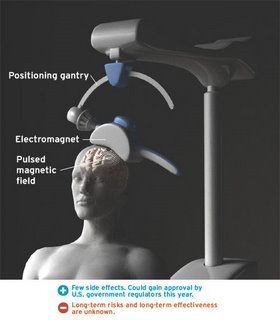|

A large study to the efficacy and safety of rTMS is recently published. The primary outcome criterion for rTMS for treatment of depression was the difference between the mean MADRS score before minus the score at week 4 of treatment. The difference between rTMS and sham TMS was not significant (p=0.057)at week 4. There was a baseline imbalance between groups. Six patients had a MADRS baseline score between 14 and 19 which is in the mild range. They were unevenly randomized across the two groups (i.e., 4 to the active and 2 to the sham). Excluding these six from the analysis finally resulted in a significant difference between groups (p=0.038), favoring active treatment. At week 6 the baseline to endpoint change on the MADRS was not significant with or without the six afore mentioned patients.
With the Hamilton Ratings Scale for Depression 17 and 24 item version (HAMD-17, HAMD-24), the difference of the mean change at week 4 was significant for both rating scales in favor of the active treatment. This advantage was sustained at week 6.
Mean differences of scores of depression severity scales are very sensitive measures. They easily lead to significant differences but are these differences not only significant but also clinically relevant.
For comparison clinician rated global illness severity showed significant greater improvement with the active treatment already at week 2 continuing to week 6.
Response rates, that is a reduction of 50% or more on the severity scale from baseline until week 4 and 6 was significantly higher for the active treatment compared to the sham treatment for all three rating scales.
Remission rates were not significantly higher for the active treatment except for the MADRS at week 6 and HAMD-24 at week 6. Remission is what you should seek in the treatment of depression . Remission rate at week 6 defined as a score on the HAMD-17 lower than 7 was 15.5%.
Patient reported mood change and global improvement were not significantly higher for the active treatment compared to sham rTMS.
Side effects of rTMS
There was more scalp discomfort and pain with the active treatment. There were no seizures. 16 serious were reported, 9 in the active treatment and 7 in the sham treatment, mostly due to disease related exacerbation.
This is the first large (n=301), multi site (23 US, 2 Australia, 1 Canada), placebo controlled trial on medication free depressed patients. Patients were required to have failed at least one but no more than four adequate antidepressant treatments. Patients with lack of response to ECT were excluded.
Dr Shock's opinion
This is a trial very well done. Due to its design only the scores on time point of week 4 are truly double-blind. They introduced a new method for sham treatment: the sham coil had a embedded magnetic shield. This study also shows that longer treatment with rTMS is well tolerated. The use of pharmacotherapy treatment failure as an inclusion criterion every time amazes Dr Shock. There are far better treatment options e.g. plasma level controlled TCAs, lithium addition and ECT to name a few.
Considering the outcome on the time point at week 4, Dr Shock is not very impressed by the results. For significant difference with the primary outcome 6 patients had to be excluded from the analysis. The mean difference between active and sham on the severity scales is in the range of 2-3 points, significant but hardly clinical relevant. Absolute figures on response and remission at week 4 are not given in this article. Remission rate at 6 weeks on the HAMD-17 was 15.5% increasing to 22.6% at week 9 with open labeled therapy. Not very impressive.
Article discussed:
Biol Psychiatry. 2007 Dec 1;62(11):1208-16. Epub 2007 Jun 14.
Efficacy and safety of transcranial magnetic stimulation in the acute treatment
of major depression: a multisite randomized controlled trial.
O'Reardon JP, Solvason HB, Janicak PG, Sampson S, Isenberg KE, Nahas Z, McDonald
WM, Avery D, Fitzgerald PB, Loo C, Demitrack MA, George MS, Sackeim HA.
PMID: 17573044 [PubMed - in process]
|
